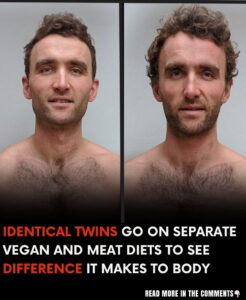Twin Adventurers Put Vegan vs. Omnivorous Diets to the Test in a 12-Week Experiment

Known for braving the world’s harshest terrains, twin brothers Hugo and Ross Turner took on a new kind of challenge—one that involved diet rather than physical extremes. In early 2020, the siblings launched a 12-week dietary experiment to compare the physical and mental effects of a plant-based (vegan) diet versus an omnivorous one. The idea stemmed from rising curiosity around vegan nutrition in the fitness world, fueled by documentaries like The Game Changers.
To ensure a level playing field, both brothers followed identical workout routines designed by Ross, who is a certified personal trainer. They trained five to six times weekly with a mix of strength and endurance work. Their meals, provided by Mindful Chef, were closely matched in calories, with the only difference being the sources of those calories—Ross ate animal products, Hugo did not. Throughout the trial, researchers from King’s College London monitored health metrics including cholesterol, muscle composition, and body weight.
What a Plant-Based Diet Offers
Whole-food vegan diets, rich in vegetables, legumes, fruits, seeds, whole grains, and nuts, are known for promoting heart health. They’re typically low in saturated fat and high in fiber, antioxidants, and beneficial plant compounds. Such diets have been linked to lower risks of cardiovascular disease, improved blood pressure, and healthier cholesterol profiles. Some evidence also suggests that well-planned vegan eating can help regulate blood sugar and reduce inflammation.
Of course, these health perks often go hand-in-hand with other positive lifestyle choices made by plant-based eaters—like exercising more regularly or drinking less alcohol—which may also contribute to the benefits seen.
Surprising Outcomes from the Trial
As the weeks went on, the twins began to feel the effects. Hugo, the vegan twin, noticed enhanced energy and sharper mental focus. He credited this partly to healthier snacking habits—replacing processed snacks with whole foods like fruits and nuts.
By the end of the study, Hugo had lost four pounds and trimmed his body fat from 13% to 12%. His cholesterol levels also improved. However, he noted one drawback: a dip in his libido during the experiment.
Ross, meanwhile, gained muscle mass on the omnivorous diet—about 10 pounds worth—but also added fat, bringing his body fat up to 15%. His cholesterol levels showed no major change.
Unexpected Gut Health Shifts
Fecal tests conducted by Atlas Biomed revealed notable changes in Hugo’s gut microbiota, showing signs of better resilience against conditions like obesity and type 2 diabetes. But curiously, both twins experienced a drop in microbiome diversity—a factor sometimes linked to greater vulnerability to chronic illnesses such as Crohn’s disease.
Recognizing that three months was a relatively short window to measure deep dietary impacts, the brothers later said they’d prefer to repeat the experiment over six or twelve months for more thorough results. Still, the experience was eye-opening, and both plan to make plant-based foods a bigger part of their regular diets.
In the end, they didn’t name a clear winner. Instead, they concluded that a balanced diet incorporating both plant and animal foods likely offers the best of both worlds. For those new to veganism, they suggest small steps—like swapping traditional snacks with plant-based ones—to make the transition easier and more sustainable.
The Turners Continue Their Bold Pursuits
This dietary trial joins the long list of daring ventures the Turner twins have tackled together. From summiting Europe’s tallest peak, Mt. Elbrus, to re-creating historic expeditions using century-old gear, the brothers have always been fascinated by the limits of human potential—both physical and mental.
Thinking of Going Plant-Based?
You don’t need to go fully vegan to reap health rewards. Even modest shifts—like reducing processed foods and incorporating more vegetables and legumes—can lead to real improvements in your well-being.
Examples from around the world highlight this point. In the longevity hotspots known as the “Blue Zones,” people often follow mostly plant-based diets, though they still include moderate amounts of meat or fish. Whether it’s the Mediterranean eating style, the diet of the Okinawans in Japan, or that of California’s Seventh-Day Adventists, these traditions all have one thing in common: plants play the starring role.